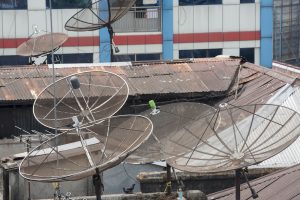Nearly four years since the military seized power in Myanmar, plunging the country into political chaos, the country has among the most tightly restricted digital spaces in the world, according to a new report released by Freedom House.
The Freedom on the Net report, released yesterday, found that global internet freedom “declined for the 14th consecutive year” in the 72 countries covered by the report, which covers 86.7 percent of the world’s internet users. It stated that just 17 percent of the world’s internet users now live in countries with a “free” internet.
Specifically, it found that Myanmar had fallen to the bottom of the ranking, where it now sits alongside China. Both nations received a total score of just 9 out of 100 on three broad categories: obstacles to internet access, limits on content, and violations of user rights. The report noted that it was the first time in a decade that China had “shared its designation as the world’s worst environment for internet freedom with a second country.”
The report refers specifically to the military junta’s imposition of a “new censorship system” and restriction of access to virtual private networks (VPNs) that allow users to evade junta internet controls, against a backdrop of ferocious political oppression.
“Since seizing power in a 2021 coup, Myanmar’s military has conducted a brutally violent crackdown on dissent and imprisoned thousands of people in retaliation for their online speech, all while building a mass censorship and surveillance regime to suppress the activities of civilian prodemocracy activists and armed resistance groups,” the report states.
“In May 2024, the military introduced new censorship technology to block most VPNs, cutting residents off from tools they had relied on to safely and securely bypass internet controls.”
The ranking speaks to the constriction of Myanmar’s information landscape since the February 2021 coup, which terminated a period of political reform that saw the emergence of a rambunctious press and growing openness to the outside world, including via digital channels. It is perhaps no surprise that Myanmar attained its highest score (40) on the Freedom on the Net report in 2014, two years after the abolition of pre-publication press censorship. This was also the year that cheap mobile phone SIM cards went on sale, spurring a rapid expansion of mobile internet access.
While Myanmar represented a particularly black spot in the report, the regional outlook was hardly encouraging, with no other Southeast Asian nation falling into the “free” category. The brightest spots were Malaysia (60 out of 100) and the Philippines (60), followed by Singapore (53), Indonesia (49), and Cambodia (43), all of which were graded as “partly free.”
Thailand (39) fell into the “not free” category, a likely result of its raft of prosecutions of users for posting online comments deemed critical of the monarchy. Vietnam, with its slightly more porous facsimile of China’s regime of internet controls, scored a lowly 22, putting it squarely in the “not free” category. Laos and Brunei were not included in the report, although it would be a surprise if either rose much beyond the mid-levels of the ranking.

































